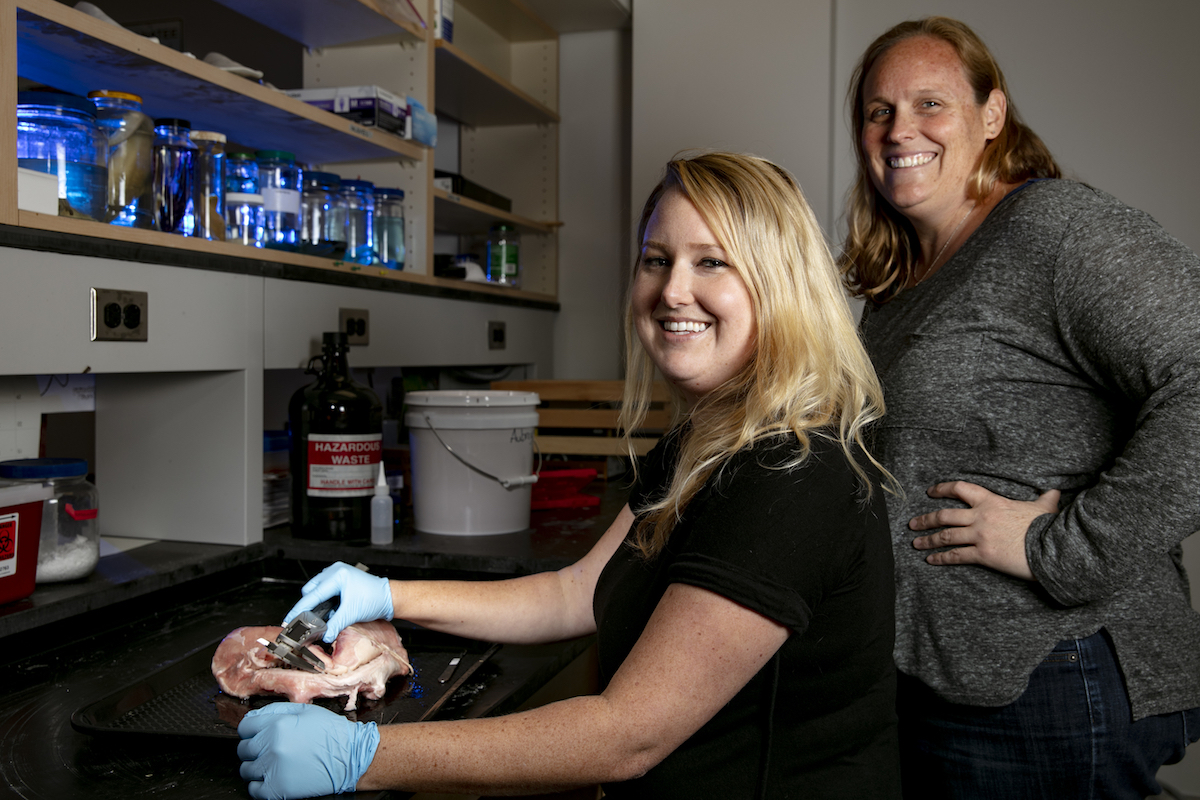Meet Ph.D. Candidate in Interactive Biology, Kate Galloway
Tuesday, Apr 28, 2020
Ph.D. candidate in Integrative Biology, Kate Galloway, goes into detail about her research, her experience at FAU as a biology student and where you can find her exhibit on lionfish in this recent Q and A.
Tell us about yourself, Kate.
Hi, I’m Kate Galloway. I’m a Ph.D. candidate in Integrative Biology Student who studies lionfish and other bony fish in Dr. Marianne Porter’s biomechanics lab. I earned my master’s along the way (Master’s in Biological Sciences) here at FAU and my undergrad degree in marine biology from U.C. Santa Cruz in California.
What about lionfish do you study?
I study the mechanical properties of lionfish spines, including their puncture performance on the skin of different predators that occasionally consume lionfish, like grouper and sharks.
And I also test and compare the performance of their spines against hypodermic needles - a biomimetic comparison. I do this by puncturing pig skin. I found that lionfish spines exhibit a greater force to puncture the skin, but they are also larger than a hypodermic needle. In the future, we would like to use a 3D printer to scale down the spines in size and print them in resin to test the performance at a similar dimension as the man-made needle.
I’m also studying the head morphology of lionfish, their spiny, bony plates. I recently submitted a paper with an undergraduate researcher, Delaney Frazier, on the topic. Not much is known about the native lionfish biology and morphology, and even less is known about the invasive species we have here in Florida. They have no significant natural predators here to put a dent in their population with how fast they can reproduce. Regardless of this, the larger they grow, the more robust their head armor gets.
What are their natural predators in the native environment?
Sharks,groupers, and eels generally eat them in areas where they are naturally found, such as Australia and the Indo-Pacific. And some of those species will eat them in Florida, however, sharks in Florida don’t recognize them as a significant food source.
Why are lionfish so pervasive in Florida?
They reach sexual maturity quickly, they reproduce fast, and one fish can lay two million eggs per year. The currents take the lionfish larvae and carries the eggs for countless miles, depositing them across oceans. And with no significant natural predators, we mainly rely on spearfisherman to help control the populations.
Are lionfish safe to eat?
Yes. People are scared to eat them, but they are perfectly safe to consume. There’s a difference between a venomous fish and a poisonous fish. Only their spines are venomous, the flesh is safe and is NOT poisonous, like a pufferfish
What do you like about FAU?
There’s a lot of support here that I didn’t experience at other schools. This includes my committee members, other faculty, and the Biology Department staff. Someone is always there to help.
Tell us about your exhibit at Gumbo Limbo Nature Center in Boca Raton.
I worked with the Florida Fish and Wildlife Conservation Commission and Gumbo Limbo Nature Center to create an interactive wall exhibit. You can feel the spines of a lionfish - we placed some spines in a resin cast. You can also see some lionfish that have been cleared and stained, so the fish no longer has any pigmentation and their bones are dyed and also illuminated so you can view the skeletal biology of the fish. It has been a long time in the making.
How can we support your research?
You can find lionfish bracelets, earrings, and bracelets on my Etsy store. I use lionfish fins that I otherwise would discard, which have a unique pattern and color, and incorporate them into custom pieces that are for sale on my Etsy site: https://www.etsy.com/shop/FishgirlFashion.